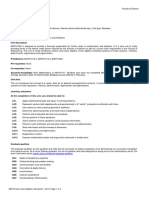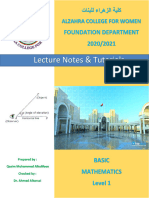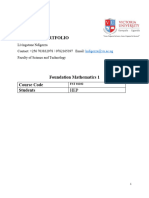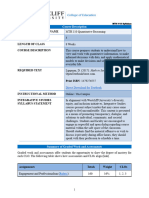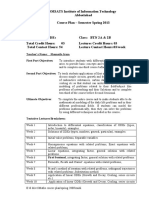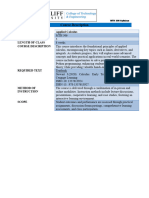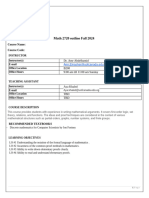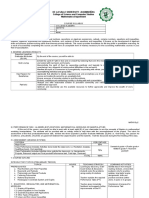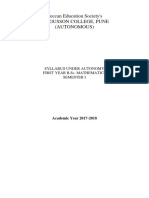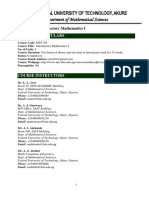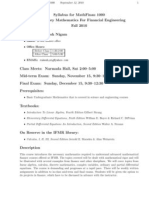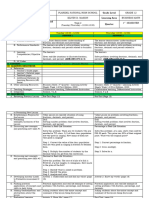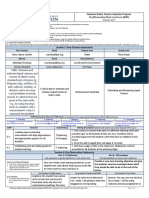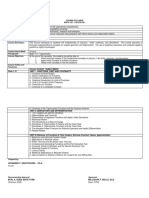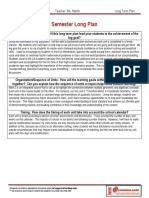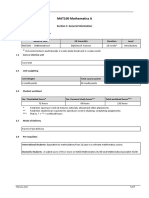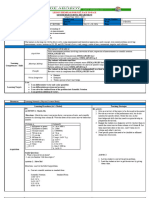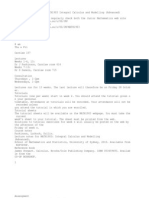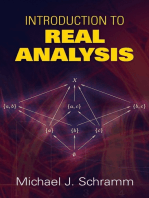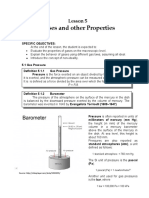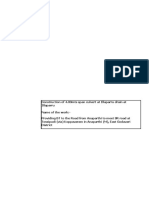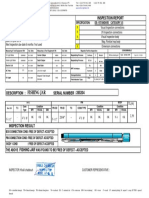2019 Math 1021
2019 Math 1021
Uploaded by
bluefox wanCopyright:
Available Formats
2019 Math 1021
2019 Math 1021
Uploaded by
bluefox wanOriginal Description:
Copyright
Available Formats
Share this document
Did you find this document useful?
Is this content inappropriate?
Copyright:
Available Formats
2019 Math 1021
2019 Math 1021
Uploaded by
bluefox wanCopyright:
Available Formats
Faculty of Science
MATH1021 : Calculus of One Variable
Semester 1, 2019 | 3 Credit points | Mode of delivery: Normal (lecture/lab/tutorial) day | Unit type: Standard
Coordinator: A/Prof Sharon Stephen
Faculty of Science , School of Mathematics and Statistics
Unit description
Calculus is a discipline of mathematics that finds profound applications in science, engineering, and economics. This unit investigates
differential calculus and integral calculus of one variable and the diverse applications of this theory. Emphasis is given both to the
theoretical and foundational aspects of the subject, as well as developing the valuable skill of applying the mathematical theory to solve
practical problems. Topics covered in this unit of study include complex numbers, functions of a single variable, limits and continuity,
differentiation, optimisation, Taylor polynomials, Taylor's Theorem, Taylor series, Riemann sums, and Riemann integrals.
Prohibitions: MATH1011 or MATH1901 or MATH1906 or MATH1111 or ENVX1001 or MATH1001 or MATH1921 or MATH1931
Pre-requisites: NSW HSC 2 unit Mathematics or equivalent or a credit or above in MATH1111
Co-requisites: None
Assumed knowledge: HSC Mathematics Extension 1.
Unit aims
The unit aims to improve your ability to think logically, analytically, and abstractly, and to enhance your problem-solving skills. In addition,
this unit will provide students with a solid foundation for further studies in mathematics and/or other scientific disciplines.
Learning outcomes
At the completion of this unit, you should be able to:
LO1. Apply mathematical logic and rigour to solving problems.
LO2. Read and write basic set notation.
LO3. Apply arithmetic operations with complex numbers in Cartesian, polar, and exponential form.
LO4. Use de Moivre’s theorem to find powers and roots of complex numbers.
LO5. Solve simple polynomial equations involving complex numbers.
LO6. Apply an intuitive understanding of a limit and knowledge of basic limit laws to calculate the limits of functions.
LO7. Use the differential of a function to calculate critical points and apply them to optimize functions of one variable.
LO8. Find inverse functions.
LO9. Use L’Hopital’s rule to find limits of indeterminate forms.
LO10. Find Taylor polynomials and the Taylor series expansion of a function.
LO11. Approximate definite integrals by finite sums and vice versa.
LO12. Express areas, and volumes of revolution, as definite integrals.
LO13. Apply standard integration techniques to find anti-derivatives and definite integrals.
LO14. Determine properties of a function defined by an integral using the graph of its integrand.
LO15. Express mathematical ideas and arguments coherently in written form.
Graduate qualities
The graduate qualities are the qualities and skills that all University of Sydney graduates must demonstrate on successful completion
of an award course. As a future Sydney graduate, the set of qualities have been designed to equip you for the contemporary world. For
more information go to sydney.edu.au/students/graduate-qualities
GQ1 Depth of disciplinary expertise
GQ2 Critical thinking and problem solving
GQ3 Communication (oral and written)
GQ4 Information & digital literacy
GQ5 Inventiveness
MATH1021 Calculus of One Variable, Semester 1 2019, Page 1 of 5
Faculty of Science
GQ6 Cultural competence
GQ7 Interdisciplinary effectiveness
GQ8 Integrated professional, ethical and personal identity
GQ9 Influence
Study commitment
For a 3 credit point unit, this equates to roughly 60-75 hours of student effort in total.
Teaching staff and contact details
Coordinator: A/Prof Sharon Stephen, sharon.stephen@sydney.edu.au
Teaching staff: Prof. Ben Goldys, beniamin.goldys@sydney.edu.au
Dr. Behrouz Taji, behrouz.taji@sydney.edu.au,
Dr. Fernando Viera, fernando@maths.usyd.edu.au
Administrative and MATH1021@sydney.edu.au
professional staff:
Weekly schedule
Learning activity Learning
Week Topic
type outcomes
Set notation, the real number line. Complex numbers in Cartesian form. Complex
Week 1 Lecture and tutorial
plane, modulus.
Complex numbers in polar form. De Moivre’s Theorem. Complex powers and nth
Week 2 Lecture and tutorial
roots.
Definition of 𝑒 𝑖𝜃 and 𝑒 𝑍 for z complex. Applications to trigonometry. Revision of
Week 3 Lecture and tutorial
domain and range of a function.
Week 4 Limits and continuity. Vertical and horizontal asymptotes. Lecture and tutorial
Differentiation and the chain rule. Implicit differentiation. Hyperbolic and inverse
Week 5 Lecture and tutorial
functions.
Optimizing and sketching functions of one variable. Linear approximations and
Week 6 Lecture and tutorial
differentials. L’Hospital’s rule
Week 7 Taylor polynomials. The remainder term. Lecture and tutorial
Week 8 Taylor series. Lecture and tutorial
Week 9 Riemann sums. Definition of definite integral. Non-positive functions. Lecture and tutorial
Fundamental Theorem of Calculus (Parts 1 and 2). Functions defined by integrals.
Week 10 Lecture and tutorial
Natural logarithm and exponential functions.
Week 11 Integration by substitution. Integration by parts. Trigonometric substitution. Lecture and tutorial
Week 12 Areas and volumes by slicing. The disk and shell methods. Lecture and tutorial
Week 13 Revision. Lecture and tutorial
Assessments
Assessment Assessme Assessment Descriptio Individual Length / Weight Due Closing Learning
title nt type n of or group duration date & date outcomes
category assessment time
type
Assignment 1 Submitted Assignment Individual 2.5% Thu 21 Thu 28
work Mar Mar
11:59p 11:59pm
m
Quiz 1 In-class Tutorial Individual 15% Mon 8- Wed 10
assessme quiz, small Wed 10 Apr
nt test or Apr
online task
MATH1021 Calculus of One Variable, Semester 1 2019, Page 2 of 5
Faculty of Science
Assessment Assessme Assessment Descriptio Individual Length / Weight Due Closing Learning
title nt type n of or group duration date & date outcomes
category assessment time
type
Assignment 2 Submitted Assignment Individual 2.5% Thu 2 Thu 9
work May May
11:59p 11:59pm
m
Quiz 2 In-class Tutorial Individual 15% Mon 20 Wed 22
assessme quiz, small - Wed May
nt test or 22 May
online task
Online Submitted Tutorial Individual 10% Weekly
quizzes work quiz, small Thursd
test or ay
online task 11:59p
m
Final Exam Exam Final exam Individual 1.5 Hrs. 55% Exam
period
Overview of assessments
Below are brief assessment details. Further information can be found in the Canvas site for this unit.
• Assignments: There are two assignments, which must be submitted electronically, as PDF files only via Canvas, by the deadline.
Note that your assignment will not be marked if it is illegible or if it is submitted sideways or upside down. It is your responsibility
to check that your assignment has been submitted correctly.
• Quizzes: Quizzes will be held during tutorials. You must sit for the quiz during the tutorial in which you are enrolled, unless you
have permission from the Student Services Office, issued only for verifiable reasons. Otherwise, your quiz mark may not be
recorded. Quizzes will only be returned in the tutorial you sat the quiz and must be collected by week 13. The better mark
principle will be used for the quizzes so do not submit an application for Special Consideration or Special Arrangements if you
miss a quiz. The better mark principle means that for each quiz, the quiz counts if and only if it is better than or equal to your exam
mark. If your quiz mark is less than your exam mark, the exam mark will be used for that portion of your assessment instead.
• Online quizzes: There are twelve weekly online quizzes. Each online quiz consists of a set of randomized questions. The
best 10 of your 12 quizzes will count, making each worth 1%. You cannot apply for special consideration for the quizzes.
The better mark principle will apply for the total 10% - i.e. if your overall exam mark is higher, then your 10% for quizzes will
come from your exam. The deadline for completion of each quiz is 11:59 pm Thursday (starting in week 2). We recommend
that you follow the due dates outlined above to gain the most benefit from these quizzes.
• Examination: The weighting for the exam has been reduced from that shown in the Handbook to accommodate includi ng
of the online quizzes. Further information about the exam will be made available at a later date on the Canvas.
Readings
All readings for this unit can be accessed on the Library eReserve link available in the Canvas site for this unit.
• Course Notes for MATH1021 Calculus of One Variable are available for purchase from Kopystop, 55 Mountain St,
Broadway.
• Reference book: James Stewart. Calculus. Cengage Learning. 8th Edition, Metric Version, 2015, ISBN 978-1-305-26672-8.
Available from the Co-op Bookshop.
Other resources
• Tutorials: Tutorials start in week 2. You should attend the tutorial given on your personal timetable. Attendance at tutorials
will be recorded. Your attendance will not be recorded unless you attend the tutorial in which you are enrolled. If you are
absent from a tutorial do not apply for Special Consideration or Special Arrangement, since there is no assessment associated
with the missed tutorial.
• Tutorial and exercise sheets: The question sheets for a given week will be available on the MATH1021 webpage. Solutions
to tutorial exercises for week n will usually be posted on the web by the afternoon of the Friday of week n.
MATH1021 Calculus of One Variable, Semester 1 2019, Page 3 of 5
Faculty of Science
• Ed Discussion forum: https://edstem.org
Late penalties
All assignments must be submitted by the due date. Students are expected to manage their time and to prioritise tasks to meet deadlines.
Assessment items submitted after the due date without an approved extension using a special consideration or special arrangement
form or request will incur penalties.
If you encounter a problem submitting your work on time, you may be able to arrange a simple extension. A simple extension is an
informal arrangement between you and your unit of study coordinator. You may be able to receive an extension of up to two working
days for non-examination tasks, as outlined in clause 66A of the Coursework Policy 2014. If you need an extension for a longer period,
you may be eligible to apply for special consideration. sydney.edu.au/students/simple-extensions
Special consideration
A special consideration application can be made for short-term circumstances beyond your control, such as illness, injury or
misadventure, which affect your preparation or performance in an assessment. sydney.edu.au/students/special-consideration-and-
arrangements
Assessment grading
The University awards common result grades, set out in the Coursework Policy 2014 (Schedule 1).
As a general guide, a High distinction indicates work of an exceptional standard, a Distinction a very high standard, a credit a good
standard, and a pass an acceptable standard.
Result name Mark Description
range
High
85 - 100 Representing complete or close to complete mastery of the material.
distinction
Distinction 75 - 84 Representing excellence, but substantially less than complete mastery.
Representing a creditable performance that goes beyond routine knowledge and understanding, but less than
Credit 65 - 74 excellence.
Pass 50 - 64 Representing at least routine knowledge and understanding over a spectrum of topics and important ideas and
concepts in the course.
Fail 0 - 49 When you don’t meet the learning outcomes of the unit to a satisfactory standard.
For more information see: sydney.edu.au/students/guide-to-grades
Educational integrity
While the University is aware that the vast majority of students and staff act ethically and honestly, it is opposed to and will not tolerate
academic dishonesty or plagiarism and will treat all allegations of dishonesty seriously.
All written assignments submitted in this unit of study will be submitted to the similarity detecting software program known as Turnitin.
Turnitin searches for matches between text in your written assessment task and text sourced from the Internet, published works and
assignments that have previously been submitted to Turnitin. If such matches indicate evidence of plagiarism to your teacher, they
are required to report your work for further investigation.
Further information on academic honesty and the resources available to all students can be found on the Academic Integrity page of
the current students’ website: sydney.edu.au/educational-integrity
Work, health and safety requirements for this unit
We are governed by the Work Health and Safety Act 2011, Work Health and Safety Regulation 2011 and Codes of Practice.
Penalties for non-compliance have increased. Everyone has a responsibility for health and safety at work. The University’s Work
Health and Safety policy explains the responsibilities and expectations of workers and others, and the procedures for managing
WHS risks associated with University activities.
MATH1021 Calculus of One Variable, Semester 1 2019, Page 4 of 5
Faculty of Science
General Laboratory Safety Rules
• No eating or drinking is allowed in any laboratory under any circumstances
• A laboratory coat and closed-toe shoes are mandatory
• Follow safety instructions in your manual and posted in laboratories
• In case of fire, follow instructions posted outside the laboratory door
• First aid kits, eye wash and fire extinguishers are located in or immediately outside each laboratory
• As a precautionary measure, it is recommended that you have a current tetanus immunisation. This can be obtained from
University Health Service: unihealth.usyd.edu.au/
Other requirements for this unit
• Attendance Requirement: Unless otherwise indicated, students are expected to attend a minimum of 80% of timetabled
activities for a unit of study, unless granted exemption by the Associate Dean.
Site visit guidelines
• There are no site visit guidelines for this unit.
Additional costs
• There are no additional costs for this unit.
Closing the loop
• Please check the Canvas site for this unit for any information.
Links to policies and other information for students
• Student administration: sydney.edu.au/study/student-administration
• Wellbeing and support: sydney.edu.au/students/health-wellbeing
• Study resources: sydney.edu.au/students/learning-services
• Expectations of student conduct: sydney.edu.au/students/student-responsibilities
• Learning and Teaching Policy: sydney.edu.au/policies/
• Academic appeals: sydney.edu.au/students/academic-appeals
• Libraries: sydney.edu.au/students/libraries
Other relevant information
• Please check the Canvas site for this unit for any information.
Other links
• Science student portal: canvas.sydney.edu.au/courses/7114
• Mathematics and Statistics student portal: canvas.sydney.edu.au/courses/7913.
MATH1021 Calculus of One Variable, Semester 1 2019, Page 5 of 5
You might also like
- Calculus: An Intuitive and Physical Approach (Second Edition)From EverandCalculus: An Intuitive and Physical Approach (Second Edition)Rating: 4.5 out of 5 stars4.5/5 (8)
- CSC102 - Discrete Structure - COURSE - HANDBOOK - SP20 - UpdatedDocument6 pagesCSC102 - Discrete Structure - COURSE - HANDBOOK - SP20 - UpdatedanamNo ratings yet
- Sydney Edu Au/students/graduate-QualitiesDocument5 pagesSydney Edu Au/students/graduate-Qualitiesbahadoor22i5583No ratings yet
- 2019 Math 1002Document5 pages2019 Math 1002bluefox wanNo ratings yet
- LSF Course Folder Calculus and Analytical GeometryDocument5 pagesLSF Course Folder Calculus and Analytical GeometryAli AhmadNo ratings yet
- Syllabus MATH421 Diif Eqs Sp23Document6 pagesSyllabus MATH421 Diif Eqs Sp23Shefaa ShalabiNo ratings yet
- Course Plan - Real Analysis I - Fall 2024Document4 pagesCourse Plan - Real Analysis I - Fall 2024numl-f22-25194No ratings yet
- De La Salle University - Manila College of Science Mathematics DepartmentDocument3 pagesDe La Salle University - Manila College of Science Mathematics DepartmentArvin Jeffrey NgoNo ratings yet
- Math1510 2023 Sem 2 CallaghanDocument5 pagesMath1510 2023 Sem 2 CallaghanBonaventure OUEDRAOGONo ratings yet
- Math 211 SyllabusDocument4 pagesMath 211 SyllabusMuhammed AydoğduNo ratings yet
- CP Trigonometry SyllabusDocument2 pagesCP Trigonometry Syllabusapi-291793268No ratings yet
- MATH 250 SyllabusDocument5 pagesMATH 250 Syllabusalicabbar9870No ratings yet
- Basic Maths WorkbookDocument145 pagesBasic Maths Workbooklemaza1000No ratings yet
- DLL 8Document11 pagesDLL 8Hazel MartinaNo ratings yet
- Discrete Course Objective-OutlineDocument7 pagesDiscrete Course Objective-Outlineiiui.student.islamabade.edu.pkNo ratings yet
- Teaching Portfolio: Livingstone Ndigezza Contact: +256 703832978 / 0782165397 Email: Faculty of Science and TechnologyDocument7 pagesTeaching Portfolio: Livingstone Ndigezza Contact: +256 703832978 / 0782165397 Email: Faculty of Science and TechnologyVincent AnzoNo ratings yet
- Mat201 PDFDocument4 pagesMat201 PDFVICTORLEGEND100% (1)
- Single Variable CalculusDocument4 pagesSingle Variable CalculusdrnnnnNo ratings yet
- Master MTH 110 SyllabusDocument11 pagesMaster MTH 110 Syllabusalonsapkota812No ratings yet
- 133710259485164574Document3 pages133710259485164574zirmalsajjadNo ratings yet
- COMSATS Institute of Information Technology Abbottabad Course Plan - Semester Spring 2013Document2 pagesCOMSATS Institute of Information Technology Abbottabad Course Plan - Semester Spring 2013Shahmeer KhanNo ratings yet
- English 120a - Statistics Facultad de Ciencias Naturales The Academic Year 2023 First Semester Instructor InformationDocument5 pagesEnglish 120a - Statistics Facultad de Ciencias Naturales The Academic Year 2023 First Semester Instructor InformationMelquisedec OlivaresNo ratings yet
- Course Outline Ssce1693 Sem1 2014-15Document4 pagesCourse Outline Ssce1693 Sem1 2014-15Wan Ahmad FaizFaizalNo ratings yet
- DLL Math Grade8 Quarter1 Week1 (Palawan Division)Document8 pagesDLL Math Grade8 Quarter1 Week1 (Palawan Division)Ami RANo ratings yet
- Physics I 1 3 0 2 4 6 No English Compulsory Bachelor Lecture, Question and Answer, ApplicationDocument4 pagesPhysics I 1 3 0 2 4 6 No English Compulsory Bachelor Lecture, Question and Answer, ApplicationmelihNo ratings yet
- MTH201 Course Outline TemplateDocument2 pagesMTH201 Course Outline Templateirisbiales2No ratings yet
- Calculus I Grade 11 of Great Hearts PDFDocument189 pagesCalculus I Grade 11 of Great Hearts PDFApuesto de MaravillsoNo ratings yet
- Syllabus Math II 2023-2024Document4 pagesSyllabus Math II 2023-2024Pedro Sevilla CarballidoNo ratings yet
- COMSATS Institute of Information Technology Abbottabad: Course Outline - Semester Fall 2021Document2 pagesCOMSATS Institute of Information Technology Abbottabad: Course Outline - Semester Fall 2021Blank StudioNo ratings yet
- Math lp1 - Nov 17Document4 pagesMath lp1 - Nov 17api-537568147No ratings yet
- MATH107 GR07 (121886) SyllabusDocument3 pagesMATH107 GR07 (121886) Syllabusnathanmutamba01No ratings yet
- General MathematicsDocument18 pagesGeneral MathematicsAzory ZelleNo ratings yet
- Math348-Course SyllabusDocument5 pagesMath348-Course Syllabusnour313hakamNo ratings yet
- CSC102 - Discrete Structure - COURSE - HANDBOOK - FALL 2021Document6 pagesCSC102 - Discrete Structure - COURSE - HANDBOOK - FALL 2021dj_fr3akNo ratings yet
- MTH 306 Applied CalculusDocument18 pagesMTH 306 Applied Calculusnextops777No ratings yet
- Course Outline of MAT101, Summer 2023.docx Sec 3Document4 pagesCourse Outline of MAT101, Summer 2023.docx Sec 3sadmansami204No ratings yet
- Mathematical Structures and ReasoningDocument4 pagesMathematical Structures and ReasoningdrnnnnNo ratings yet
- MATH-110 Multivariable CalculasDocument3 pagesMATH-110 Multivariable Calculaszulqarnainriaz50No ratings yet
- MATH-110 Multivariable CalculasDocument3 pagesMATH-110 Multivariable Calculastayyabamughal861No ratings yet
- Daily Lesson Log CORE - GAS - General MathematicsDocument3 pagesDaily Lesson Log CORE - GAS - General MathematicsHannae pascuaNo ratings yet
- MATH110 Syllabus College Algebra - Doc 2014.doc SyllabusDocument4 pagesMATH110 Syllabus College Algebra - Doc 2014.doc SyllabusRiz Dadole-Geocadin100% (1)
- MTH103 CourseOutline Jan2024 HsuDocument8 pagesMTH103 CourseOutline Jan2024 HsugarbuttjalilNo ratings yet
- F.Y.B.sc.-MathematicsDocument10 pagesF.Y.B.sc.-MathematicsRakesh JamesNo ratings yet
- MATH291Document8 pagesMATH291mNo ratings yet
- CalculusI2019 PDFDocument2 pagesCalculusI2019 PDFlu cucuNo ratings yet
- MATH7 Q1 Week 5Document4 pagesMATH7 Q1 Week 5leonardoalbor05No ratings yet
- MTS 101 (C)Document6 pagesMTS 101 (C)Usman Samuel BabalolaNo ratings yet
- FE Preparatory Maths SyllabusDocument3 pagesFE Preparatory Maths SyllabussunnyabhijithNo ratings yet
- Business Mathematics Week 2Document4 pagesBusiness Mathematics Week 2KILVEN MASIONNo ratings yet
- Revised 4.20.17: Use Questions To Guide Reflection On The Lesson Plan. Provide Feedback On Lesson Plan ReflectionDocument6 pagesRevised 4.20.17: Use Questions To Guide Reflection On The Lesson Plan. Provide Feedback On Lesson Plan Reflectionapi-378234656No ratings yet
- Calculus IDocument7 pagesCalculus IAngel Guillermo Jr.No ratings yet
- Long Term PlanDocument7 pagesLong Term Planapi-375234253No ratings yet
- MAT100 Mathematics A OutlineDocument6 pagesMAT100 Mathematics A OutlineDheerajYelkurNo ratings yet
- General Physics Lesson ExemplarDocument9 pagesGeneral Physics Lesson ExemplaranthonydongonNo ratings yet
- Math 1903Document7 pagesMath 1903Stephen Michael CaraherNo ratings yet
- LECTURE NotesDocument106 pagesLECTURE NotesyaonlyliveoncefanscardNo ratings yet
- Mathematics Resource Package: Quarter I Subject: MATH Date: - Content StandardDocument9 pagesMathematics Resource Package: Quarter I Subject: MATH Date: - Content StandardJohn Mark PalmaNo ratings yet
- Introduction PPT Math Modules 234Document21 pagesIntroduction PPT Math Modules 234Sultan KubsaNo ratings yet
- QC Lab Equipment 1calibration ListDocument5 pagesQC Lab Equipment 1calibration ListHariom GuptaNo ratings yet
- fdt-104 EmbankmentDocument1 pagefdt-104 EmbankmentGenevieve GayosoNo ratings yet
- Fieldwork No. 7 Reciprocal LevelingDocument5 pagesFieldwork No. 7 Reciprocal LevelingreggiesalamidaNo ratings yet
- CMC Calculations For Force Measurements Rev6Document40 pagesCMC Calculations For Force Measurements Rev6Naim AburayyamNo ratings yet
- Study Material Term 2 Xi Physics 2021-22Document176 pagesStudy Material Term 2 Xi Physics 2021-22Rudresh Kalasannavar100% (2)
- Neeraj Kumar Atomic StructureDocument56 pagesNeeraj Kumar Atomic Structuresrigurujuniorcollege14No ratings yet
- Properties of Waves 2024Document42 pagesProperties of Waves 2024shepherdwishmorengwenyaNo ratings yet
- C3 6KW Bodor en To Ro 2024-11-03 08-29-19Document9 pagesC3 6KW Bodor en To Ro 2024-11-03 08-29-19Popan AdrianNo ratings yet
- MA 214 Lecture 12Document72 pagesMA 214 Lecture 12Harsh ShahNo ratings yet
- Gases and Other Properties: Lesson 5Document7 pagesGases and Other Properties: Lesson 5lucifer angelNo ratings yet
- Effective and Relative PermeabilitiesDocument45 pagesEffective and Relative PermeabilitiesТемирлан АльпиевNo ratings yet
- Iso 9427 2003 PDFDocument8 pagesIso 9427 2003 PDFkulin_banNo ratings yet
- Design 3.00 M Slab CulvertDocument60 pagesDesign 3.00 M Slab CulvertVallabhareddy Nageswara RaoNo ratings yet
- PT Prestress LossesDocument27 pagesPT Prestress Lossesxhq08No ratings yet
- Fouling Factor: Given Data A B C Uc UdDocument14 pagesFouling Factor: Given Data A B C Uc UdChou ChouNo ratings yet
- Introduction To Process Control 2nd Romagnoli Solution Manual All Chapter Instant DownloadDocument99 pagesIntroduction To Process Control 2nd Romagnoli Solution Manual All Chapter Instant Downloadjashlmallori1100% (11)
- XI - ENGLISH - Sample PaperDocument13 pagesXI - ENGLISH - Sample PaperPearlNo ratings yet
- NDE Procedure: Leak Test and Test No. /Z 07-FiDocument4 pagesNDE Procedure: Leak Test and Test No. /Z 07-FiVũ Lê NguyênNo ratings yet
- RA01 Magnetic Force1 - Amit SharmaDocument27 pagesRA01 Magnetic Force1 - Amit SharmaPadam MantryNo ratings yet
- OL Physics Book 1 (MCQ Theory) 2008 Till 2021Document409 pagesOL Physics Book 1 (MCQ Theory) 2008 Till 2021ABDULLAH'S SWEET VIDEOSNo ratings yet
- PS4 SolutionDocument9 pagesPS4 SolutionGuido GilliNo ratings yet
- Unit 3 TrigonometryDocument36 pagesUnit 3 TrigonometryHanif AshranNo ratings yet
- 11-Term 1Document7 pages11-Term 1Chandrawati DeviNo ratings yet
- Scientific Examination of Documents. by Ordway Hilton 1982Document8 pagesScientific Examination of Documents. by Ordway Hilton 1982mberengwamercy84No ratings yet
- 2012 Book ViralMolecularMachinesDocument685 pages2012 Book ViralMolecularMachinesmenchuNo ratings yet
- Fishing Jar 285204 .Document1 pageFishing Jar 285204 .Khalil ChabbouhNo ratings yet
- Soil Structure Interaction of ESR ScopeDocument7 pagesSoil Structure Interaction of ESR ScopeMiraj SaradharaNo ratings yet
- MA5158 Practice Problems-Unit2Document3 pagesMA5158 Practice Problems-Unit2Mithun arjunNo ratings yet
- Copenhagen Interpretation PDFDocument5 pagesCopenhagen Interpretation PDFTianyu HuangNo ratings yet
- 2.0 Psychrometry With Sample ProblemsDocument21 pages2.0 Psychrometry With Sample ProblemsRenneil De PabloNo ratings yet



